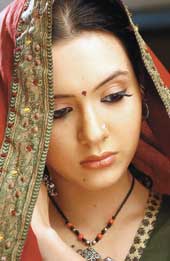 |
 |
 |
 |
| (From top) Isha Sarvani debuts in Kisna, Ismail Durbar with wife Ayesha, the Kisna music launch and the other debutante Antonia Bernath |
Allah ne saare badon ko ek saath jama kar diya,? laughs Ismail Durbar, days before the release of Kisna, the Warrior Poet ? Subhas Ghai?s next film set in British India, 1940s. After all, it is not in every release that one sees A.R. Rahman sharing credit, that too with a man who has arrived in Bollywood with two of the biggest musical hits in recent years ? Hum Dil De Chuke Sanam and Devdas.
?The fact is Rahman had already done two songs for the film but he was not being able to find time to complete the score,? Durbar clarifies.
Fate has so far tied Durbar to an ironic relationship with the virtuoso composer. Hum Dil De Chuke Sanam had reached the cinemas the same year as Rahman?s Taal. The latter swept the awards, leaving Durbar only with the National Award. The same story was repeated a couple of years later with Devdas and Saathiya.
If there is one consolation in the misses, it is the fact that Rahman took the trophies home. ?Had it been anyone of lesser calibre, I would have taken it badly,? admits Durbar.
The certificate that Durbar gives Rahman is rare in dog-eat-dog Bollywood. ?He is a good boy, understands music and respects others. At the IFFI awards in Goa, he came over to tell me that he has loved my work in Kisna. Even when he won earlier, he always said: ?Tu hi iss award ka hakdaar hai?.?
Soothing notes of amicability there. But the calm blows over as soon as Bhansali?s name is mentioned ? Sanjay Leela Bhansali, who made Ismail Durbar by giving an unknown violinist the chance to compose for a big-budget film. ?He started regarding himself as my khuda once he gave me the break. But I also left 32 films to do his Devdas. Had I accepted those offers, I would be a crorepati today. Still, I was ready to stick to him, but he should have compensated for my losses. I also have a family to feed, you know,? he says, bitterness building up by octaves at the recollection.
If a tight-fisted producer pinched Durbar?s pocket, he also put hurdles in his path to fame. ?The music of Devdas swayed the nation, yet no one was coming to me. Month after month, I sat heart-broken at home, torn between frustration and confusion, wondering what was going wrong. If that film created one Devdas, it was me. Just that, I do not touch liquor!?
It is only the other day that Durbar got to know from a journalist that Bhansali had stopped her from interviewing the composer after Devdas. That made the pieces of the puzzle fall in place. ?Humko media se hatha diya, industry se hi gayab kar diya,? he exclaims.
There is no place for Durbar in Bhansali?s next musical project Bajirao Mastani. But a healing touch has come from Subhash Ghai. ?I am not the sort to go knocking on doors. Ghai saab himself called me over.?
The melody-maker feels he is starting life afresh with Kisna. ?I come from a poor family in Surat. My father played with a group of qawwals. My cousins belonged to a band party. But business dried up during monsoon when no weddings took place. Then we sold utensils.? At the age of 13, he travelled to Mumbai to learn how to play the violin. ?I missed my family, my friends. Yet never did I shed a tear.?
Talk of the music of Kisna, and his voice resonates. ?The first song I recorded was a qawwali. I had composed it all alone at night during Ramazan. Subhashji liked the song so much that he held it back till the end to picturise it with care. The setting is a wedding in a nawab?s haveli, with Sushmita (Sen) dancing. The scene has come off so well that it looks straight out of Mughal-e-Azam or Pakeezah.? Another song that Durbar has singled out as a chartbuster is the Ramleela number Woh Kisna hai. He is not far off the mark as Vivek Oberoi playing the flute among village belles is on every countdown show.
Kisna has a Calcutta connection in the form of an illustrious voice. ?Ustad Rashid Khan has sung for me. I told him to just hold the tune. He sang without accompaniments, for about 10 minutes, and I was floored.?
Durbar harps back on his Devdas experience by way of comparison and the name on his mind is that of debutante Shreya Ghoshal, whom Bhansali had hand-picked from an antakshari show on TV to sing for Paro. ?She was just a kid. It took hours to get her to express every word correctly. Even then, justice was not done to my compositions.?
And in Durbar?s view there is just as much difference in the visions behind the two films as there is of class between a Shreya Ghoshal and a Rashid Khan. ?In Kisna, the poor live like the poor. The village girls wear cotton saris. They do not stay in big havelis or move around clad in finery. Perhaps the music was the only aspect that was genuine in Devdas,? he sighs.










